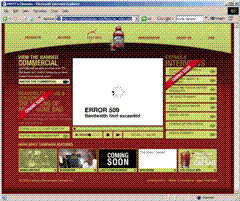Google's pigeons rate of failure
Thursday, May 26, 2005
Google's news search is accurate enough to properly display the harvested images with their harvested copy. Well, most of the time.

I.e. That guy looks like Jennings, as
Carrie seems to be the opposite gender of male. I saw bits and pieces of both shows: Jeopardy and U.S.A. Idol - Bo should have won, and Jennings has been too busy counting his 2.5 million dollars :) He sucked...

I'm not the the type to point fingers at lazy birds, but I know which slacker
pigeon screwed up. Just don't tell google.
May two-four fireworks
Tuesday, May 24, 2005

In Canada there are a few long weekends during the summer. Some of these days include fireworks at the end of the day.
I never know why we have long weekends, but they are a welcome vacation to many. I.e. Most business establishments and office governments are closed.
Yesterday was "May two-four," as it's called and we decided to go see the fireworks with my son. It was one of Gabriel's many firsts.
It rained a bit, but we had some blankets, popcorn, chairs, and the child like expectation for something that will make history. It was a great day.
We waited for 2 hours for an event that lasted 10 minutes.
Throughout the whole thing, I kept looking at the explotions and kept wondering how the
pellets needed to be packed in order to make the many different patterns and how much energy was released with each blast.
Gabriel, on the other hand, was probably not thinking of the physics - I really don't know what he was thinking, but I kept looking at his face. It was fun to watch him watch the explosions. To a child, everything is unknown and full of wonder.
In the midst of the event he said "Dreams do come true."
I never knew it was a dream of his to see the fireworks and I don't know where he heard the expression, however, I think his first dream came true yesterday :)
With the passage of time, I'm sure his dreams will grow in complexity and the realization of his many dreams will probably take a bit more effort than a 15 minute trip to the park.
"End world hunger," "Peace on earth." I'm sure they are somebody's dream.
P.S. Since my blog is mostly related to Java, I was going to write a Java applet with some fireworks. There are too many already, so here is a list of the ones I found interesting:
Firework Java Applet 1Fireworks Java Applet 2And whatever else google says it's out there.
Paying for ads
Thursday, May 19, 2005
I don't know if TV corporation get the web.
I think the problem TV corporation have is that they don't know their viewers as well as they should.
Sure, they know how many people live in their area and how much income the average household pulls in. But they don't know WHO and HOW the viewers are actually using the boob tube.
I happen to watch TV once in a while (I don't have cable - See below for the reason) and I've caught myself watching TV and visiting a site as it's mentioned in different ads. I have the computer in my lap, so I quickly type in the site's addres.
It hit me: it's the new way of getting information while being entertained.
Do news stations know this? Do advertiser know this? That passivity leads to activity? Even though you stop watching, you keep attached to their message and this time you actually are looking for information you want and their brand is consciously and purposely in your mind while visiting the site. I wonder?
Tonight the news were on while I was updating one of the sections in my
resume and I over heard a commercial's anouncer saying that their spot had been taken out of the air because it was too racy. Sure enough, the ad mentioned a URL where the spot can be watched at will. I.e. We, web surfers, are not ruled by the same "decency laws" as the TV watching populus :)
I was curious, so I went to the site.

A terrible thing
happened.
Because the advertiser and the TV station don't know their watchers-users, the ad was not available in their web site within 20 seconds of the anouncement. The site ran out of connection and, most importantly, bandwidth.
The site was
slashdotted.
It was a good idea to announce that the ad was in their web site, however it was a bad idea NOT to prepare for the traffic.
The site melted. Like I said, TV companies don't know how viewers watch TV and what they are watching; the advertiser doesn't know who is watching TV; and most importantly, in this case their IT department was probably never told to get ready for all the traffic.
I still don't know why the commercial was pulled out of the air. And probably never will now, my attention span is very short, like any other viewer: 3 seconds and I'm gone.
It's too bad, really. It was a great opportunity, but no one knew how to prepare for the wave of passive-active watcher-users.
No cableWatching TV used to be a give and take relationship between the viewer and the TV station.
It's was all part of the social contract: you get entertained for free if only you watch a few commercials. TV used to be free. I.e. It was distributed via radio waves.
Things have changed, though. We now pay for cable or satellite. So, TV stations have a dual revenue model: we pay for cable, and advertisers pay to get their ads played. So, where is the viewer in all of this? I guess we pay to watch commercials. Who would have thunk it? - BTW, it's not such a stretch: we even pay for bottled water now. Yes water.
And this trend of paying to watch commercials is so pervasive that we actually pay to watch them in huge screens: movie theaters.
Have you noticed the commercial before watching the latest flick. I know, it's so annoying.
Anyway, I don't pay to watch commercials at home anymore. I don't do cable. I haven't had cable for about 6 years. I decided to forgo cable because my local cable company would not transfer all my cable services to my new location for free - I know what you are wondering: "How many more times can this guy write cable in the same sentense." Not many, but keep on reading...
When I had to move, I called my ex-cable company and asked to transfer all my services to my new address. I was told that I needed to pay $100.00 to move everything to my new location.
I told the customer representative that I didn't want to pay. She said that everyone had to pay. I said that I didn't want to pay and I explained to the rep. that I had my Internet connection with them, I was a premium cable subscriber and that I was even a subscriber of their digital services (fairly new then) and movie packages. All and all I was paying around $120.00 per month.
She went away for a few minutes and told me that they would lower the fee to $59.00. I said that I wanted to pay $0.00 dollars. She went away again and came back and said that they were willing to lower the fee to $49.00. I said that it wasn't good enough. She then said $39.00. I said nope and said: "Look, if I have to pay to move all my services, I will cancel all of it. Right now."
She then said: "Mr. Sandoval, we will lower your transfer fee to $24.99." And I said no. I said that I wanted to pay $0.00. She said that they couldn't do it. Then I told her to cancel ALL my services. I've been cable free since then.
So, the way I look at it, the cable company servicing my local area has lost approximately $8,000.00 so far. And their loses don't stop there, because I'm sure I would have paid for cable and internet access until I could see or type no more. A trade of $50,000.00+ for $24.99 - It makes a lot of sense.
I will not buy services from this company: cable, internet, cell phone, etc. None of it, muah-ha-ha. Ok, it's not that evil. It's just a fact of the way our economy is set up: we have choices.
BTW, I tried doing the same thing for my phone service. It didn't work so well. If only I didn't need a phone or internet and I had more choices. Canada's phone services are kind of monopolized by one big company in some areas - No wonder it's called a monopoly :) Some would argue that it is an oligopoly (more than one, but very few). I'll believe it when I see it.
Finally1. I don't do cable/satellite.
2. How can TV companies integrate the web in their programming? If you know, I predict you will be a very wealthy person.
And I don't mean the type of boring shows where the hosts read blogs to their audience. Yes, you read right: read blogs to the audience. If it's good enough for
CNN every other news chain should do it, too (And some are). It's as exiting as watching yourself breathing - on a mirror.
3. On a final note, Microsoft will probably end up doing something about this type of passive users with their new XBox 360 (and beyond) - What Microsoft really wants is to control the living room with their entertainment computer system. They already have a big check beside the "Control desktop market" todo item.
I'm sure someone is already developing some technology to quickly add a URL as a bookmark item into your browser by cliking some button in your TV remote control. Better yet, have the commercial send a signal to your browser's bookmark or "favorites" list.
It's the new way: you watch TV, but at the end of the program you can visit the web sites that interest you.
Of course, this system can be abused. Imagine all the stupid SPAM URLs you'll get in your bookmarks. I'm sure though, that all those millions of R&D dollars can solve a couple of these problems. Also, most TV advertisers still care about their corporate image, so SPAM may not be such a big problem after all.
Extreme Future
Monday, May 16, 2005

Artistic depictions of future societies tend to be extremely extreme.
Orwellian art depicts a grey, totalitarian, and fear infused future - All together: "WAR IS PEACE," "FREEDOM IS SLAVERY," "IGNORANCE IS STRENGTH," "The Party is never wrong."
When the future has a greenish tint to it, we humans are used as batteries for the survival of, ironically, human-built super computers in some sort of matrix - "Wow, I know kung-fu."
Huxley depicts his future as a daze of somatic dullness - Who's the savage now?
George Lucas, on the other hand, invented a future in 1971 that is mostly white in an endless white holographic 'crazy' room.
Is there a middle ground?
Comercial J2ME product
Thursday, May 12, 2005
J2ME applications are bound to become popular at some point. It is taking a while, though. Let's see how J2ME applications do in the next couple of years now that RIM is almost as popular as sliced bread.
The advantage of the BlackBerries, for us Java developers, is the fact that we don't have to worry about the JVM - We can assume it is pre-installed.
I've developed a couple of custom J2ME apps in the past (2002). One of the most interesting ones was a
prototype application to read from a serial port into a J2ME enabled phone (Motorola i85) and store the read information into a J2EE application via HTTP. Pretty cool stuff, I think. This particular application is too specialized to be sold commercially and needs too much customization.
So, I decided to try the J2ME shrink wrap application market with a couple of application I'm currently developing.
The first application I'm currently selling is a
Histogram Calculator for J2ME devices via
Handandgo.
Handandgo is an interesting software distribution company. They take 40% of the sale and 60% goes the creator of the software. It's definitely not cheap to distribute your software on handango, however, they take care of all cost of distribution and payment fulfillment.
For small software vendors (like myself, currently) it is a "good" deal. I.e. marketing software can get quite expensive and time consuming.
So, for the $9.99 sale price of my application, handandgo gets $3.99.
I'll keep track of how many sales my program generates. To give you an example of my expected revenues, if my application were to be sold 250 times:
Total: $9.99 x 250 = $2,497.50
Jose's money: $2,947.50 x .6 = $1,498.50
Handandgo's money: $989.00
Not bad, but, this application would have to generate many thousands of paid downloads to make this whole experiment profitable. And unless there is an extremely high demand for mobile statisticians, I don't think I'll stop the other aspect of my current
career. But, you just never know. Did you know you need a Histogram Calculator for your mobile device? :)
In the end, I'm doing it more for the experience and to keep up to date with J2ME market. It's bound to really pick up.
I'm also a great believer of merging the large with the small. In this case: J2EE with J2ME - I'm predicting that phone banking will be as big as web banking is now.
BTW, I realize that if I wanted to sell J2ME application on Handango for a living, I should start inventing better looking apps or just create J2ME games that are part instant messaging programs/part shoot them up game, that let you take pictures of you while playing, and download music tones that play constantly as your reward.
BTW2, if you buy it and send me an email, I will send you the source code, which is worth much more than $9.99 - I.e. J2ME doesn't calculate Normal distributions given than java.lang.Math.exp() doesn't exist in the CLDC profile.
Top 40 under 40 - Why 85% male and 15 % female?
Monday, May 09, 2005
According to the 2001
Canada census, the population of Canada was: 30,007,095.
A more detailed breakdown:
| | 0-19 | 20-64 | 65+ | Total | | Males | 3,983,140 | 9,061,055 | 1,662,655 | 14,706,850 | | Females | 3,795,725 | 9,278,620 | 2,225,900 | 15,300,245 |
|
Male median: 36.8 years
Female median: 38.4 years
There shouldn't be much difference in the population distribution from 2001 to 2005. Except, that there are more people now - Give or take a million or so.
This morning I saw an article titled "Top 40 Under 40." It was published in one of the national news papers in Canada. The
article came to my attention from a University's homepage, as universities are always the first to mention when one their graduates earns a public award of some kind.
In this year's awards, the
University press claims there are 6 Waterloo grads with the honour. That's not surprising, given that the University of Waterloo is one of the best institutions in the country when it comes to Mathematics and Computer Science (bias aside). What did surprise me when reading the article was the distribution of names in the list: there are more male names than female names. In fact there are 36 males (2 males got the award as one) and 5 females. The award should be more accurately named "Top 41...".
I have one question: why are there so many more males than women in the "Top 40 under 40"?
Given the statistics from the 2001 census above, you'd expect around 20 males and 20 females in the list of 41. And not the observed 36 to 5 male to female ratio.
How are these selections being made by the judges? Shouldn't the recipients of the awards be more representative of the population in general? How is it that there is such a big gap of women in leadership, according to these silly awards?
Let me speculate a little:
- We could argue that there are more men in leaderships roles than women. Why is this the case? That should be a problem in itself
- Another factor to take into account is that women under 40 are sometimes raising a family and some decide to stay home instead of working their way up the corporate ladder - For some reason, men are more inclined to work rather than stay home to raise a family - I think raising a family is harder work
- In order to qualify for the price, one must be nominated - Perhaps more men nominated more men than women. Again, why?
- There are more men under 40 in the work force - Perhaps, but I really doubt the numbers are so disproportioned
I can only speculate and I can't really say for sure why there is such discrepancy in the Top 40 under 40, without a proper socio-economical study of the general population in Canada and award recipients (I.e. education level, familial status, etc.)
One thing we do know, however, that the number of women in the profesionally active in the sciences is decreasing. Is this the reason for having less women in leadership in Canada? Not enough women in the sciences?
As per these awards, I don't know if there is any discrimination against women in the judging. There probably isn't any discrimination. The only way to know would be to see the original list of nominees and the results. It's unlikely to get this from the judges, but one can wonder, though.
Awarding the "Top 40 under 40" is hardly news worthy unless you're the one receiving the award. The only reason the article caught my attention, like I said, was due to the inacurate representation of the general Canadian population in the list of award winners.
Given that we are being so sensitized towards social equalities of every kind, I was expecting to see a relatively equal amount of women and men in the top 40 under 40: Did the judges think of my sensitivity? Did anyone else notice? Does anyone care? Does it even matter who gets these corporate sponsored awards?
You could ask the judges personally if you like:
For further information about Canada's Top 40 Under 40 (TM) program, please contact:
Meegan Wilush or Michelle Jursa
Program Managers
c/o The Caldwell Partners
165 Avenue Road, 5th Floor
Toronto, Ontario M5R 3S4
Toll Free: 1-800-688-5540
Toronto: 416-920-7702
email: awards@caldwell.ca
Note that the judges are all volunteers and, ironically,
mostly males - Perhaps more diversity in the judging panel would bring more diversity in the winners, I wonder.
BTW, I'm way too lazy (or don't have enough incentive) to check all the other years' winners and make a more complete comparison. If you are inclined, complete the summary and send it to me to add to this page - Also, if you ask the corporation hosting the event and you get a response, let me know.
One final thought: If I seem overly sensitive about any type of discrimination, I guess the social awareness programs have worked - However, personally I think meritocracies are more effective when awarding any type of price for any type of skill. I.e. "There is, in fact, an I in wInner." So, the list still stands and "Top 40 Under 40" still
lives on, with 36 males and 5 females.
Disclaimer: I'm only asking the question why the list is not representative of the general population in Canada. I'm not implying there was any discrimination against either gender. Also, the award is sponsored by a corporation, so they do as they please.
How to create a web demo in 5 minutes
Wednesday, May 04, 2005
See the demo without reading the blog entry...There are some software products that are free and, most importantly, useful that don't make it into the limelight list of applications. I.e. Word, et al.
Wink is a "free" utility that allows you to create flash movies of your interaction with your operating system. For us mere mortals, the OS is Windows or Linux or Mac OS X.
You can use Wink to create demos of your products and distribute them via your web site, since the whole demo is actually a flash movie. How many times have you wished you could show someone how to do something, rather than explain it via email or via phone. I guess, now you could.
I wanted to give this tool a try and this
tutorial was borne: a tutorial of how to use the "Recent Posts" section in my web site.
I think the "Recent Posts" section is self explanatory, however, it is not entirely clear as to how blogger has chosen to sort the entries. The default is actually by date. I.e. Most recent entries show on the top (I think that's logical).

Anyway, the point of my "Recent Posts" section tutorial is not the tutorial itself, but the time it took me to build the whole thing: approximately 5 to 10 minutes - And I'm a slow typer.
Why is this tool free?
I guess is one of those application that is good enough for someone to pay for it, however the creator decided not to charge for it.
I mean, how much would you charge for it? It seems so trivial, yet so useful. And if you had Flash Director, you could just build it by hand - But, that would require someone to know how to use flash.
I'm also not quite certain you could build a descent business or a marketing plan around one single niche tool.
Or maybe you could, but can a business be grown into a multi-million dollar empire of Winks distributors? Maybe, maybe not - If we could only get
Steve Jurvetson to invest - I mean, this guy may have invested in Gutenberg's printing press, for all I know :)
Ok, this is a bad .com joke. In case you didn't get it: Jurvetson was the king Midas of the 1990's. Anything he (and his company) invested in went IPO and made him quite wealthy at a very young age - Well, he's not so young any more and he is a bit older than me :)
I guess Wink's creator, by making the tool "free," kind of helps to balance the universe:
give and ye shall receive, I guess...Mind you that my free software is not as useful as Wink. To be fair most of the commercial (and useful) software I write is highly confidential and written under contractual agreements.